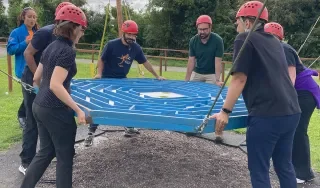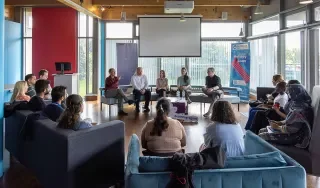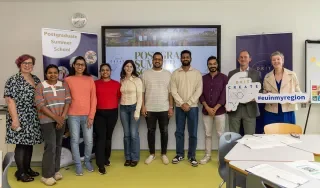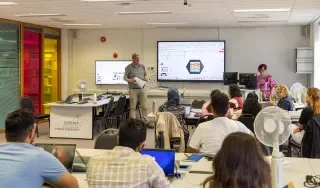Research and resilience in focus at DkIT’s inaugural Postgraduate Summer School
Dundalk Institute of Technology recently hosted its inaugural Postgraduate Summer School, a four-day event that brought together PhD students from across DkIT’s research landscape for a programme of learning, collaboration, and resilience-building.
The Summer School delivered eight dynamic workshops, blending key research and academic issues, personal and professional development, and opportunities for genuine cross-disciplinary networking. Designed as part of the CREATE-DkIT project, the initiative centred on the theme; ‘CREATE impact through research’ and aimed to provide the next generation of researchers with skills and tools needed to tackle global challenges for maximum impact. CREATE-DkIT is a TU-RISE project, co-funded by the Government of Ireland and the European Union through the Northeast & Midlands Regional Programme 2021–2027.




The series of events began with a session titled, Sustainable Thinking in Research: Tools for Global Impact, facilitated by Paul Crewe from Development Perspectives, an Irish-based NGO focused on global justice and sustainable development. Crewe challenged participants to consider the broader environmental, social, and global implications of their research, introducing practical frameworks for integrating sustainability principles into methodologies, partnerships, and dissemination strategies.
On Day 2, “Spot the Trap: Navigating Predatory Journals and Conferences,” co-led by Suzanne Smith, Research Policy Compliance Officer at DkIT, and Frank Brady, Library Director, highlighted how to identify predatory publishing, with examples, checklists, and group activities to sharpen critical evaluation skills. This was followed by “Thinking with AI: Enhancing Research Through Creative and Ethical Collaboration,” where DkIT lecturer, Dr JJ Quinlan showed how AI can support research while stressing the need for integrity and critical thinking.
The day closed with “Navigating the Postgraduate Journey: You Are Not Alone,” facilitated by Suzanne Smith, which encouraged open discussion of challenges facing postgraduate researchers. DkIT Student Union President, Gerry O’Brien and Ending Sexual Violence and Harassment Prevention and Response Manager, Siobhán Molloy also outlined supports available to postgraduates, from mental health resources to advocacy services.
The final on-campus day began with a lively ‘fireside chat’ examining ways researchers can enhance their careers by building collaborative networks. Facilitated by Dr Tim McCormac, Panellists Dr Julie Doyle from the NetwellCASALA Research Centre, Dr Paul Mac Artain from the School of Engineering, Ms Aminah Dastan, a postgraduate researcher of Tourism Research Groups, and Mr Barry O’Connor, Managing Director of Advanced Medical Parts, shared practical approaches to initiating collaborations, sustaining partnerships, and leveraging networks to open up career pathways.
Following this, Eileen Dunne, founder of Carbon Coaching and a certified Life & Executive Coach, guided participants through exercises to clarify personal values, manage self-doubt, and build emotional resilience—essential skills for the long haul of a PhD.
The afternoon concluded with a session on “The Power of Engaged Research,” facilitated by Orla Lynch, DkIT Research Office Manager. Participants were introduced to the principles of Engaged Research and examined how working directly with key stakeholders can benefit research, create real-world impact, and drive lasting change.
The week ended with an off-site team building event in Carlingford’s Crystal Maze. Set against the stunning backdrop of the Cooley peninsula, participants were divided into teams and faced with a series of mental and physical challenges designed to test their lateral thinking, problem solving and communication skills.
Feedback from attendees indicated that all sessions hit the mark. Postgrads reported learning new skills, identifying available supports, and enjoying the cross-disciplinary engagement with other researchers. Furthermore, feedback from attendees is now informing the development of a new researcher training initiative, additional supportive resources, and the agenda for the next DkIT Postgraduate Summer School, in June 2026.
Please visit https://www.dkit.ie/research/create for more information on the CREATE-DkIT Project and updates on the 2026 Postgraduate Summer School.